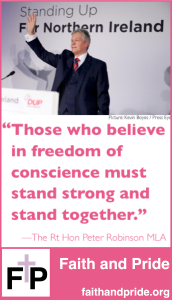At the end of February 2015, this letter was sent to all the Northern Irish MLAs, all the Northern Irish MPs, the Lords Spiritual, some of the Lords Temporal with an interest in Northern Ireland, some religious leaders with an interest in Northern Ireland, and other political figures. You can download a PDF of the letter.
Dear Friend,

I am the founder of Faith and Pride, a non-denominational gay Christian organisation in Northern Ireland. Although I now live in Gibraltar, Faith and Pride remains active in Northern Ireland, and I myself retain strong connections to East Belfast, where I was born and where I lived for more than 38 years. I am writing to you because in the frequent political debates about religion and same-sex relationships, the rights of gay Christians are often forgotten, if it is remembered that we exist at all. This is particularly true when same-sex marriage is discussed.
In Ireland during the Penal Law period, religious freedom was restricted. The religion of the ruling elite was elevated above the religions of everyone else. The people of Ireland, on both sides of the border, have paid a heavy price for that. One of the ways that religious freedom was restricted was by controlling other people’s freedom to marry. During the period of the Penal Laws, Presbyterian weddings had no legal standing. There was no legal bar to a Presbyterian church performing a wedding, but the couple would not have been married in the eyes of the law.
Fortunately, we live in a much more enlightened time. Two people married in a Presbyterian church are just as married as a couple who married in a Church of Ireland church. We recognise that people have different religious and philosophical approaches to marriage, and the law recognises all of them. Anything else would be unthinkable bigotry.
If you support religious freedom, that means that you support the right of people to live their lives according to different standards to you. That means you support laws that accommodate other denominations and religions to exactly the same extent that your denomination or religion is supported. That means if you are a staunch and conservative Catholic, then you support Presbyterian weddings, even though you would never marry in a Presbyterian church yourself. That means if you are a member of the Church of Ireland, you support legal recognition of civil weddings as surely and completely as you support legal recognition of weddings in your own parish church.
When my husband and I married in a Non-Subscribing Presbyterian church in Belfast in 2011, we were in much the same position as a couple who were married in a Presbyterian church in Belfast in 1711. Whilst the service wasn’t illegal, it had no legal standing. We had to take other steps to get the law to recognise our relationship.
There are churches that want to treat same-sex and opposite-sex couples in exactly the same way, performing marriage ceremonies that are religiously and legally significant, regardless of the genders involved. There are gay Christians who want this. It is what my husband and I wanted. The law in Northern Ireland currently prevents churches from doing this. This is a restriction to religious freedom: a restriction to freedom of conscience. This is just as severe, and just as offensive, as the situation regarding Presbyterian marriages during the Penal Law era.
Religious freedom has not lead to Catholic churches being forced to marry atheist couples, nor Anglican churches having to marry dyed-in-the-wool Presbyterians. Same-sex marriage happens in many parts of the world, and I know of no case of a church being forced to perform a same-sex marriage against its will, yet the law of Northern Ireland still prohibits the legal recognition of same-sex marriage. There is no freedom of conscience on this issue. The position of Christians and churches is decided not by faith but by the law.
Religious freedom unquestionably means support for Catholic weddings, Church of Ireland weddings, Presbyterian weddings, Methodist weddings, Christadelphian weddings, civil weddings, and it means support for same-sex weddings. The Rt Hon Peter Robinson MLA, leader of the DUP, recently said, “Those who believe in freedom of conscience must stand strong and stand together.”1
That is unquestionably true, and everyone who supports freedom of conscience and freedom of religion must support same-sex marriage, so that those of us who believe in same-sex marriage can practise our religion as freely as those who do not.
Stand up for freedom of conscience. Stand up for religious freedom. Stand up for same-sex marriage.
Yours in Christ,
Andrew
Andrew McFarland Campbell MA MSci (Hons) (Cantab)
1 Leader’s Speech at DUP Party Conference, 22 November 2014, http://web.archive.org/web/20141208081916/http://www.mydup.com/news/article/conference-2014-leaders-speech-rt-hon-peter-robinson-mla


